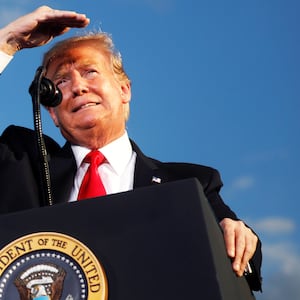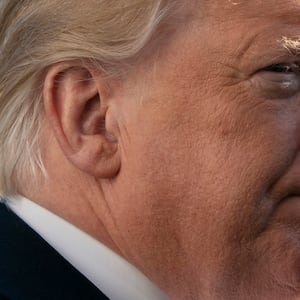Long before becoming president, Donald Trump called for the jailing of his adversaries. Aided by Attorney General William Barr, he may now actually be training the full force of federal law enforcement against his enemies, real or perceived. Unlike Richard Nixon, who acted in secret, Trump is corrupting the justice system openly and publicly.
The seriousness of such a presidential abuse of power, and its potential for undermining the constitutional order, could well surpass any of the crimes detailed in the Mueller Report. Indeed, the Congress long ago recognized that such misconduct can merit impeachment.
Trump’s desire to investigate the investigators who uncovered the Russian plot to elect him president has taken on a special urgency since the release of the Mueller Report, with Trump repeatedly accusing government officials of “treason,” and the White House declaring: “This whole thing was a TAKEDOWN ATTEMPT at the President of the United States.”
On Thursday night, after Trump had spent days excoriating the purportedly “treasonous” investigators by name, he announced he had granted Barr the “full and complete authority” to declassify documents relating to the Russia probe. The White House also stated that Trump had directed intelligence agencies to “quickly and fully” cooperate with the investigation into the investigation.
It’s reminiscent of Nixon’s secret scheme to “use the available federal machinery to screw our political enemies,” as then-White House Counsel John Dean put it, by manipulating “grant availability, federal contract, litigation, prosecution, etc.” Nixon directed the IRS provide potentially damaging information against some of his enemies. Although the agency’s commissioner refused Nixon’s demand, the scheme became part of the impeachment case against Nixon, which accused him of illegally endeavoring “to obtain [information] from the Internal Revenue Service, in violation of the constitutional rights of citizens.”
While much of Nixon’s scheme was forestalled, Trump appears poised to effectuate his. Barr recently named Connecticut U.S. Attorney John Durham (best known for investigating the FBI’s corrupt relationship with Boston mobster James “Whitey” Bulger) to head up an inquiry into the “origins” of the Russia investigation. Unnamed government officials have attempted to minimize the significance of the inquiry by stating to the press that it does not currently entail the use of grand jury subpoenas, but that of course could change at any time—indeed, Senator Lindsey Graham is publicly demanding as much.
Barr, meanwhile, has become remarkably open about his intent to follow the president’s lead by making the investigators the focus of as much opprobrium as possible. In Senate testimony several weeks ago, Barr denied endorsing the president’s accusation that there was “improper surveillance”of the Trump campaign. More recently, however, he responded to a Fox News interviewer’s question whether he “smell[ed] a rat” at the FBI by stating: “I don’t know if I’d describe it as a rat. I would just say that the answers that I’m getting are not sufficient.” In the same interview, Barr emphasized that officials at the highest levels of the FBI and other agencies were involved, in a plain allusion to James Comey and the other former high-level law enforcement and intelligence officials that Trump has repeatedly excoriated.
Trump’s initial target was Hillary Clinton.Trump implored Jeff Sessions (ultimately with some success) to reopen an investigation into unsubstantiated claims that she had improperly interfered in the sale of a uranium mining concern, Uranium One, to a Russian company as secretary of state. In November 2017, the New York Times’s called 10 former attorneys general, but only one responded to its question whether Sessions should accede to Trump’s loud demands: It was Barr, who said he saw no problem with the president training the sights of the Department of Justice on a political enemy, as long as it was “warrant[ed].” Barr even opined that the evidence against Clinton was stronger than any potential evidence of wrongdoing by the president, this despite the fact that the primary “evidence” for the Uranium One allegations came from a book sponsored by Steve Bannon.
Barr seemed unconcerned with the risk posed by a president employing the Justice Department as a mechanism for exacting revenge against a former electoral opponent. Indeed, Barr declared, the department would be “abdicating its responsibility” if it did not pursue Clinton as Trump desired. In a memorandum he later wrote to the DOJ officials overseeing Mueller, and shared with Trump’s defense team, before becoming attorney general, Barr asserted that there is “no limit” on the president’s authority to direct the course of law enforcement investigations, including those he is personally interested in.
In fact, Trump’s effort to undermine the legitimacy of the now-completed Russia investigation is part-and-parcel of Trump’s earlier efforts to limit and even terminate the investigation while it was ongoing, conduct that the Mueller Report identified as potential obstruction of justice, and that Trump (with Barr’s support) has asserted merely amounted to “fighting back.”
Barr suggested to the Times that there is just no problem with a president personally selecting who should or should not become the subjects of criminal investigations, as long as the facts “warrant” inquiries. But that entirely misses the point.
As the nation recognized during the Watergate era, if the president employs the apparatus of the federal government to single out and punish political or personal enemies by making them the focus of law enforcement investigations, the perception (and the reality) of fairness on which our justice system depends will be gravely endangered.



